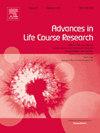Gendered life-course trajectories of childcare and informal care in the Netherlands
IF 3.4
2区 社会学
Q1 Medicine
引用次数: 0
Abstract
Unpaid caregiving remains highly gendered both in the context of childcare for young children and informal care provided to ill or ageing family members, friends, or neighbors. Using a life-course framework, this study expands previous research which generally treated these care types as separate life domains, by exploring the variety in caregiving trajectories including both childcare and informal care as integral parts of life courses. In addition to identifying and describing clusters of caregiving trajectories, we examine to what extent these are stratified by gender and education. We use unique retrospective survey data on informal caregiving combined with longitudinal data on childrearing, collected by the LISS Panel in the Netherlands (N = 1631). Using sequence and cluster analysis, we created caregiving trajectories covering up to 50 years of individual life courses and identified six clusters of caregiving trajectories that differed in care-heaviness, based on different combinations of the timing, duration, order, and intensity of care episodes. Our findings indicate path-dependency in care patterns, whereby most individuals who have engaged in unpaid care, provided both childcare and informal care at various points throughout their lives. In addition, while patterns of caregiving over the life course did not differ by gender, women were overrepresented in care-heavier clusters while men were more likely to follow the least care-heavy clusters. Theoretical expectations predicting educational differences based on opportunity costs and normative pressure were not supported. Given the anticipated rise in informal care due to population ageing and welfare state retrenchment, our findings suggest that while both women and men will be increasingly confronted with balancing unpaid care with other commitments, the gender gap in care-heaviness might persist and even widen.
荷兰儿童保育和非正式照料的性别化生命历程轨迹
无论是在幼儿保育方面,还是在为生病或年老的家庭成员、朋友或邻居提供非正式护理方面,无偿护理仍然高度性别化。利用生命历程框架,本研究扩展了以往的研究,这些研究通常将这些护理类型视为独立的生命领域,通过探索护理轨迹的多样性,包括儿童保育和非正式护理作为生命历程的组成部分。除了识别和描述护理轨迹的集群外,我们还研究了这些轨迹在多大程度上由性别和教育分层。我们使用了荷兰LISS小组收集的关于非正式照料的独特回顾性调查数据,并结合了关于儿童养育的纵向数据(N = 1631)。利用序列和聚类分析,我们创建了长达50年的个人生命历程的护理轨迹,并根据护理事件的时间、持续时间、顺序和强度的不同组合,确定了六个不同护理重的护理轨迹集群。我们的研究结果表明了护理模式的路径依赖性,即大多数从事无偿护理的个人在其一生的不同阶段提供儿童保育和非正式护理。此外,尽管一生中照顾的模式没有性别差异,但女性在照顾较多的群体中所占比例过高,而男性更有可能遵循照顾最少的群体。基于机会成本和规范压力预测教育差异的理论期望不被支持。由于人口老龄化和福利国家的紧缩,预计非正式护理将会增加,我们的研究结果表明,尽管女性和男性都将越来越多地面临平衡无薪护理与其他承诺的问题,但在护理负担方面的性别差距可能会持续存在,甚至会扩大。
本文章由计算机程序翻译,如有差异,请以英文原文为准。
求助全文
约1分钟内获得全文
求助全文
来源期刊

Advances in Life Course Research
SOCIAL SCIENCES, INTERDISCIPLINARY-
CiteScore
6.10
自引率
2.90%
发文量
41
期刊介绍:
Advances in Life Course Research publishes articles dealing with various aspects of the human life course. Seeing life course research as an essentially interdisciplinary field of study, it invites and welcomes contributions from anthropology, biosocial science, demography, epidemiology and statistics, gerontology, economics, management and organisation science, policy studies, psychology, research methodology and sociology. Original empirical analyses, theoretical contributions, methodological studies and reviews accessible to a broad set of readers are welcome.
 求助内容:
求助内容: 应助结果提醒方式:
应助结果提醒方式:


